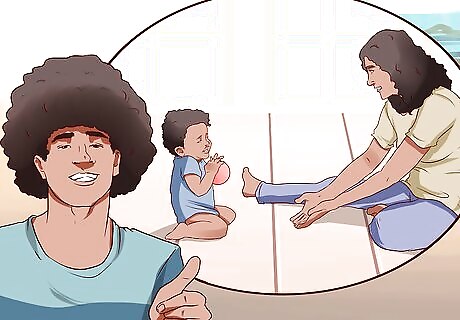
views
Developing a Relationship with the Children

Keep the first interactions simple. When first meeting with your significant other’s children, you should keep the meetings short and simple. Pick a friendly and manageable setting for the first meeting. This can be a restaurant the children like or even a quick meeting at the park. Avoid long dinners or all day events by keeping it short. A weekend getaway for a first meeting is not a good idea. Stick to a set manageable time, like an hour or two, or even a short hello, and gradually increase how often the children spend time with you. This helps the children ease into meeting you and getting used to you. Try asking the children about their favorite subjects in school, hobbies, favorite toys, activities they like to do, etc. For example, you can say something like, “What is your favorite thing about school?” Or, “What do you like to do for fun?” Try not to talk too much about yourself. Instead, focus on asking questions and showing your significant other’s children that you find them interesting. You can do this by listening carefully and asking follow up questions to keep them talking. For example, if one of the children says she likes to play soccer, try saying something like, “That’s cool! What position do you play?” or “What do you like best about playing soccer?”

Allow the relationship with the children to develop slowly. Though you may instantly feel affection for your significant other’s children, the reverse may not be true. Relationships need time to grow, and this is especially true for stepparent/stepchild relationships. Understand that the kids will take time to look at you as an authority figure or a figure they love. Try to be patient as the relationship develops. Keep being a caring, loving figure in the children’s life while you let the relationship develop at a natural pace. Ask the children about what is new in their lives since you last saw them. For example, you can say something like, “How was school this week?” Or, “What’s new with you?” This will show the children that you are interested in their lives. Follow up when the children tell you about things they are worried or excited about. For example, if one of the children says she is anxious about a big test, ask her about it the next time you see her. Try saying something like, “How was your math test?” This will show that you are paying attention to what they tell you and you care about what happens to them.

Join in activities the children enjoy. One way to build a relationship between you and the children is to do activities with the children that they enjoy. Ask the children what they like to do and offer to do it with them. If you really enjoy an activity, offer to let the children come with you or teach them how to do your hobby. For example, if the children love playing video games, offer to play video games with them. If they like sports, go to the park and throw some balls around or shoot some hoops. Take the children shopping if they love fashion or go to a comic book store with them. If you love tennis, teach them how to play. If you love to cook, teach the kids your favorite recipe.

Develop a relationship based on trust and honesty. Developing a relationship with the child will take time. You will have to build trust between you and the children. To do this, start by listening to the children and remembering things they say. Take an interest in the children and their interests. This will help show the children that you care about them. If the children talk to you about private issues they don’t feel comfortable going to their parents about, keep it private. This only applies as long as the information doesn’t endanger the children or anyone else.

Make time for the relationship between your significant other and the children. Many times, it may seem to the children that you are stealing their mom or dad because you are spending a lot of time with them. The children may not be used to having you around doing things their other parent used to do. Make sure that you make time for your significant other to spend time and do things with the children without you around. This will help them to feel more secure and view you less as a threat. For example, if your significant other only sees their children every other weekend or once a month, the children may need quality time with their parent. Letting the children and your significant other spend time together alone may help your relationship with the children more than always trying to spend time with them. Just as important, make sure that you are not resentful or angry that your significant other needs to spend quality time with their kids without you sometimes. Allowing them this time helps keep the children from thinking that you are taking away their parent.

Ask for support from your significant other. If you are having trouble with your significant other’s children disrespecting you or treating you badly, then you should discuss it with your significant other. They are the biological parent and should not allow their kids to disrespect you or fail to make any efforts toward accepting you. Sometimes the words of their parent can intervene and help mitigate the problems. If you have any problems early on, do not act like the disciplinarian but ask your partner to intervene on your behalf.

Try to empathize with your significant other’s children. Getting your significant other’s children to accept you might be challenging. For the children, the situation can be scary, confusing, and hurtful. They might not feel ready to develop a relationship with you just yet. Remember, the children have dealt with a divorce or a death, they may have moved from their home or changed schools, and they may have had to lose friends or even pets along with these changes. Be patient and understanding with the children. Try to put yourself into their shoes and think about how you might feel as a result of all of these changes.

Understand that the children may still want their parents together. Sometimes, the children may not be resistant to the idea of you because of anything that you have done. Instead, the kids may be holding on to the hope that their parents are going to get back together. When you enter into the family, you become a reminder that the parents will not get back together. Allow the children time to work through the hurt and grief that their parents will never reunite. This doesn’t just happen with young kids. Many older kids keep hoping that their parents will one day get back together.
Avoiding Common Mistakes

Avoid trying to replace the other parent. Though you may now be in a parental role because of your relationship with your significant other, this does not mean you should try to replace the children’s birth parent. You are serving a new role for the children, as a third (or fourth) loving adult figure. Don’t tell the children that you are their mother or father. This can cause problems in your relationship if they feel you are trying to take the place of their birth parent. Some kids may feel guilty when they start to feel love or affection for you. They may start to think that their feelings for you mean that they no longer love their birth parent. Help them to understand that they can love both of you because you are not their birth parent and are not trying to take that role. Help them learn that you have a different role in their life.

Refrain from being fake or insincere. No matter the age of your significant other’s children, they will be able to tell if you are sincere or not. Don’t try to be fake or overly enthusiastic to get them to like you. If you need time to get used to the kids or the situation, then give yourself time. Don’t be rude to the children, but don’t be fake or insincere either. That might cause more harm in the long run. Instead of being insincere with fake affection or showing fake enthusiasm, treat the children like someone you are getting to know. If the children are adults, then treat them like you would any adult you are learning about and trying to form a relationship with. If the children are younger, talk to them like a person instead of talking down to them. Fake, condescending tones or conversations may do harm to your relationship. For example, don’t use baby talk or change the tone of your voice when you talk to the children.

Avoid causing problems between your significant other and the children. Sometimes, you may accidentally cause problems between your significant other and the children. Avoid trying to cause problems between them. If you have concerns about the way things are with your significant other and the children, or you have concerns about the parenting style, talk to your significant other separately to try and come up with a healthy solution. For example, you do not want to force your significant other to choose between you and their kids, because this is an impossible choice - or a choice you may not be happy with if the significant other chooses the children. You also do not want to try and turn your significant other against the other birth parent. This may cause problems between your significant other and the children.

Refrain from being their friend. You may be tempted to get the children to like you by any means necessary. This means you may decide to try and be the children’s friend or act like the cool sibling. Refrain from doing this. Though you are not their birth parent, you are still an adult figure in their life. You will have to enforce discipline and act as an adult. You can enjoy things they like and spend time with them. But remember to keep it on a caring adult-child level, not as a best friend. Refrain from engaging in harmful activities with them to get them to like you, like lying or covering up for them or condoning inappropriate behavior behind your significant other’s back. Even if the children are adults, you should never try to become best friends with them. This could cause problems with the overall family dynamic.

Avoid talking badly about the other parent. Never talk badly or disrespect the children’s other birth parent. No matter what your feelings are about the other birth parent, talking badly about them will more than likely lead to problems between you and the children, and probably problems between you and the birth parent. Instead, be positive and supportive of the relationship between the children and the other birth parent. Even if you are having trouble with the other birth parent in your new relationship, leave the children out of the problems and keep it just between the adults. Never make it seem like you're a threat to the other parent. Make certain the children understand that you are not trying to replace their birth parent or take the place of the birth parent. Encourage the children to talk about their birth parent or spend time with them.
Welcoming the Children into Your Home

Respect the children. If you want respect from the children, you should return the same respect to the children. This means you should respect the feelings, opinions, and interests of the children. If the children don’t like you or the situation right now, back off and try to let the relationship grow naturally. Don’t try to force the children to do anything against their will. Remember, no matter the age, the children are people with feelings, too. Make sure you respect each child’s privacy. Don’t go snooping in their rooms, go through their stuff, or listen in on their phone calls.

Treat the children like family. If you are living with your significant other, then you may be tempted to treat the children as special guests and go all out when they come to visit. This may cause a separation between you and the children, or make the children feel like outsiders. Instead, treat the children like normal members of the family. Taking the children to special places every time you are together never allows the children a chance to get used to the new family. Letting them experience everyday situations can help them to get used to the new family arrangement. Include the children in family discussions and major decisions that affect the entire family. Help the children with their schoolwork, go to their school performances or sports games, and even attend parent-teacher conferences.

Create an environment where the children’s voices are heard. Oftentimes, when children come from homes where the parents are no longer together, they feel undervalued or invisible. Help your significant other create a family dynamic where the child is part of the family. Encourage the child to voice their opinions honestly and openly. Let them know that you are willing to look at things from their perspective and consider their ideas and opinions. Help the children feel appreciated. Give them praise and encouragement when they do things for the family or offer suggestions. Provide a safe, loving environment for the children. The children need to feel safe and secure, and creating a safe, open environment can help them feel at ease in their new home.

Establish consistent rules. You and your significant other need to establish ground rules for the children and the house. You need to make sure you give the children love and affection, but also set boundaries and guidelines that are consistently enforced. This gives them a routine and stability that will help them adjust to their new life and know what to expect. Sit down with the children and your significant other and make the rules clear. Encourage the children to have a say in the rules and expectations of the house. This can help the children feel like they have a voice and are not being controlled or overshadowed by you. For example, don’t change the rules or boundaries without discussing it with the children. Also refrain from rewarding the children out of guilt.
















Comments
0 comment